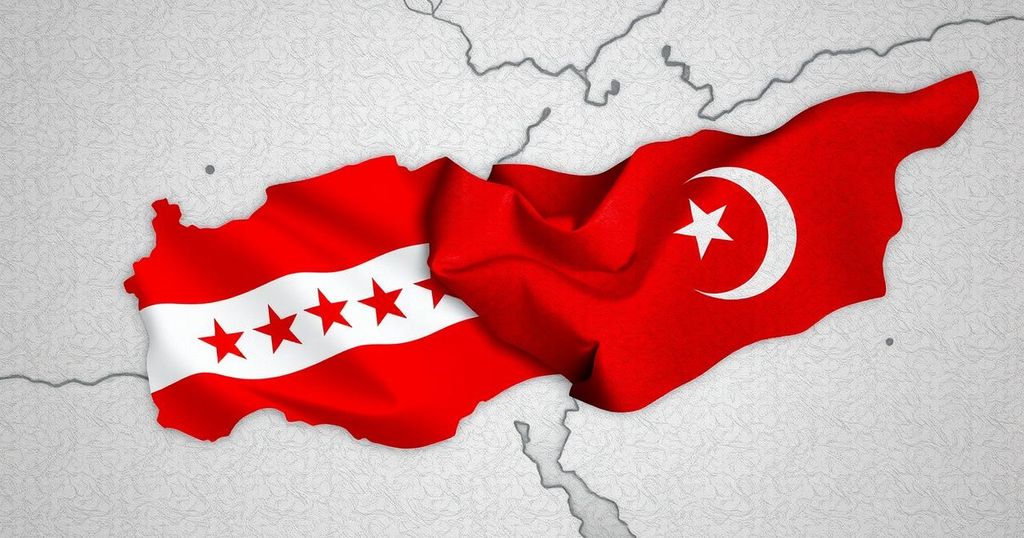Turkey’s Ascendancy in Post-Assad Syria: Strategic Moves and New Opportunities
Following Assad’s exit, Turkey has elevated its influence in Syria, as evidenced by the raising of its flag in Damascus after a 12-year absence. Turkey’s strategic moves, including support for HTS and engagement with Syrian Kurdish groups, demonstrate its keen interest in maintaining leverage and pursuing reconstruction efforts. Erdoğan’s balancing act with refugee issues and national sentiments further underscores the complexities of Turkey’s position in evolving regional dynamics.
Turkey has prominently increased its influence in Syria following the departure of President Bashar al-Assad to Moscow, evidenced by the Turkish officials raising their flag in the Syrian capital for the first time in over a decade. This significant moment followed the visit of Ibrahim Kalin, Turkey’s spy chief, who was seen navigating the streets of Damascus, showcasing Turkey’s emerging role under a new government. Analysts suggest that Ankara has leveraged this situation to gain a foothold in northern Kurdish regions while simultaneously engaging in the Syrian reconstruction efforts.
In recent months, Turkey hesitated to allow the Turkish-backed group Hayat Tahrir al-Sham (HTS) to act, instead seeking dialogue with Russian and Iranian officials regarding Assad. However, the refusal of Assad to negotiate ultimately enabled Ankara to adopt a more hands-off approach, resulting in HTS’s rapid offensives against the Assad regime. This unforeseen success has granted Turkey new opportunities to pursue its foreign policy goals, particularly with the impending U.S. withdrawal from the region.
President Erdoğan has found himself in a complex balancing act concerning the Syrian refugee crisis, weaving together a narrative aimed at appeasing both humanitarian concerns and nationalist sentiments within Turkey. The fall of Assad allows him to adopt a favorable position regarding the repatriation of Syrian refugees while addressing the concerns of nationalist factions. Concurrently, Turkish officials are anticipating a surge of Syrian returnees, with Foreign Minister Hakan Fidan asserting that Turkish companies would facilitate the reconstruction of Syria.
In the broader context, Ankara has recently begun outreach to previously vilified Kurdish fighters, in a clear attempt to exploit the shifting dynamics within Syria. As Turkey-backed rebel forces have successfully gained ground against U.S.-backed Kurdish groups, the situation indicates a rapid regional transformation with Turkey striving to capitalize on this momentum.
With Turkish presence now established in Damascus and an overarching strategy defined, officials are intent on preventing the establishment of a Kurdish administration in northeastern Syria. In this new geopolitical landscape, Turkey is expected to play a pivotal role in aiding HTS, fostering cooperation that could secure international recognition of the group while simultaneously looking to invest in the redevelopment of Syria post-Assad.
The article discusses Turkey’s strategic positioning following the power vacuum left by the ousting of Syrian President Bashar al-Assad. The context highlights Turkey’s historical engagement in Syria and its careful diplomatic maneuvering to influence regional dynamics. With the fall of Assad, Ankara’s actions reflect both an expansion of influence and a calculated approach to gain leverage over Kurdish factions in Syria. The article outlines the implications of Turkey’s renewed engagement as well as its domestic repercussions regarding the management of Syrian refugees.
In conclusion, Turkey’s emergence as a key player in post-Assad Syria reflects a combination of opportunism and strategic planning. As Ankara navigates its complex relationships with various factions and responds to internal pressures concerning refugee populations, it stands to gain significantly from the shifting political landscape. Erdoğan’s efforts to present himself as a leader sympathetic to Syrian refugees while managing domestic dissent illustrate the multifaceted nature of his approach in these tumultuous times.
Original Source: www.theguardian.com




Post Comment